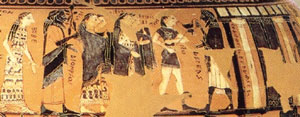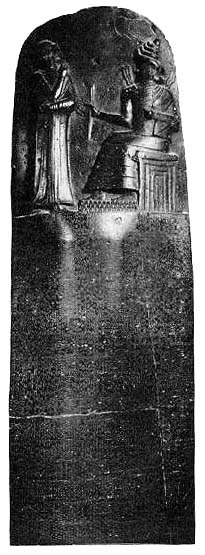
Dowry: Peleus, future father of Achilles, greets the guests at his wedding; the bride Thetis waits inside the house (Sophilos; British Museum, ca. 580 BC)
When did people start to exchange dowries?
Beginning about as far back as there are any written records, about 3000 BC, people exchanged money as part of a marriage. The custom is probably much older than that, even. Suppose a girl’s father wanted her to marry a boy.
Families in early Africa
History of money
All our Africa articles
Then both of their fathers would get together. They’d discuss the financial arrangements. Usually, the girl’s father agreed to give the boy something valuable. Maybe it was some cows or a sheep, or a piece of farmland, some beads, or some gold jewelry. We call this gift a dowry. (You say DOW-ree).
Dowry and divorce
What if the couple got divorced, later on? Then the husband had to return his wife’s stuff. This gave him a good reason not to divorce her, because he would lose the dowry. And, if he did divorce her, it gave his wife some income to live on when she went back to her father’s or brother’s house. (In those days, the husband usually kept the children, so there was no need for child support payments.)
Earliest laws about dowry

Code of Hammurabi – an early law code from the 1700s BC
The Code of Hammurabi from about 1700 BC talks about dowry. The Babylonians ruled that the husband had to return his wife’s dowry if he divorced her. He also had to return her dowry to her family if she died without having any sons. If her husband died, the wife also got her dowry back. Their children inherited the rest of her husband’s stuff, but she got the dowry. That way the widow would have something to live on.
Code of Hammurabi project
Hammurabi of Babylon
Women in Mesopotamia
Dowry or bride-price?
Not all early marriages involved a dowry. In some places, like Archaic Greece, according to Homer, the custom went the other way. The husband’s family paid a bride price to the woman’s family instead. The woman’s family was supposed to hold onto the bride price in case she needed it.
People’s customs go back and forth between bride price and dowry depending on many things. For example, it depends on whether there are more single women or more single men. It can also depend on the power of women in that culture.
Who gives bride-price and who gives a dowry?
The custom can change quickly. In Classical Greece, and in the early Roman Empire the main gift was a dowry. Then in the later Roman Empire, after about 200 AD, the custom changed so that men paid a bride-price instead.
Women in ancient Greece
Roman women
Who were the Visigoths?
Medieval Islam and women
Women in Europe
So did the invading Germanic tribes like the Visigoths and the Vandals. But in medieval Europe, the main gift was a dowry again. The Quran, from the 600s AD, also tells Islamic men to provide a dowry. In Victorian England, it was difficult for girls to marry without a dowry.
Dowries and bride-price in India and China
Fathers gave dowries or bridge prices not just in Europe and West Asia but all over the world. The Indian epic, the Ramayana, was written probably about 300 BC. It tells how Sita brought a huge dowry for Rama when they got married. In ancient Africa, bride price was more common than dowry, though both were known.
Women in ancient China
What’s the Ramayana?
In China, there were also shifts between bride price and dowry. It depended mainly on changes in inheritance law and the control men had over property. At the end of the Han Dynasty, about 200 AD, boys were paying a bride price in order to marry a girl. But during the T’ang Dynasty in the 600s AD, the father paid a dowry when his daughter got married.
Dowries and bride-price in the Americas
Even as far away as North America, fathers paid dowries when their daughters got married, or boys paid bride prices. Iroquois husbands, for example, paid bride prices about 1500 AD, usually deer or deerhides.




